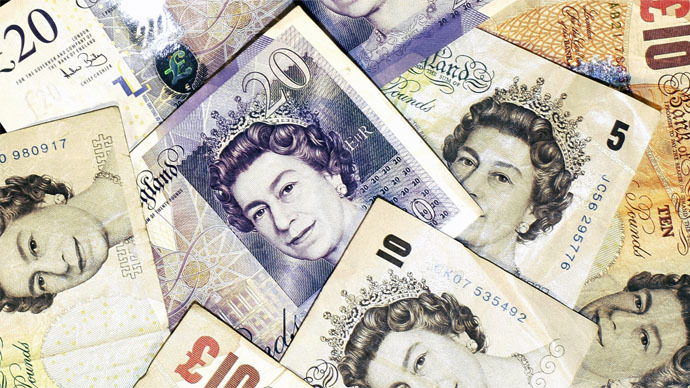‘Britain awash with dirty money,’ says anti-corruption think tank

Criminals, tax evaders, human traffickers and drug dealers have laundered billions of pounds worth of dirty money purchasing British properties through anonymous offshore companies, Scotland Yard investigators suspect.
The Metropolitan Police say more than £180 million (US$276 million) worth of British property has been subject to criminal investigation since 2004 as potential proceeds from corruption.
Detectives say this figure is merely the tip of the iceberg.
READ MORE: Dirty money: 19 UK firms alleged ‘complicit’ in $20bn laundering scam
While tax evasion and corruption are likely to be the most common sources of dirty money in Britain, drug dealing, human trafficking and black-marketeering where sanctions are in place are also possible origins, police say.
The sheer scale of the problem was uncovered on Wednesday by a report produced by anti-corruption think tank Transparency International (TI) UK. The group says the UK has become “a safe haven for corrupt capital stolen from around the world.”
Web of secrecy
In London, roughly 36,342 properties have been purchased through clandestine front companies in offshore tax havens.
Favored locations include the British Virgin Islands, the Isle of Man and Jersey.
Britain’s wealthiest borough, Westminster, has the highest proportion of properties held offshore (9.3 percent), while Kensington and Chelsea follow closely (7.3 percent).
Although many of these sales remain secret for legitimate privacy purposes, a large proportion are thought to have been purchased to stash ill-gotten gains.
Almost 1/10 properties in #Westminster (9.3%) owned by #offshore companies http://t.co/Z84v5RNWgr#OffshoreLondonpic.twitter.com/FnL3UBmBBf
— Transparency Int'lUK (@TransparencyUK) March 4, 2015
Some 50 percent of the 144 properties subject to Met investigation are registered to firms in UK offshore territory Jersey. In such a case, the owner or benefactor’s identity remains obscured from public knowledge.
Meanwhile, £3.8 billion worth of UK property was purchased by British Virgin Island (BVI) registered firms in 2011.
TI UK says authorities’ response to Britain’s continued influx of ill-gotten gains is inadequate.
Suspicious Activity Reports (SRAs) are commonly submitted by executives in financial firms to state authorities to report suspicious financial activity.
The most recent official figures indicate estate agents only submitted 0.05 percent of SRAs tendered to the government in 2013-14. TI UK says this figure does not represent the risks money launderers pose to Britain’s property market.
36,342 LDN properties - 2.25 sq miles - held by #offshore haven companies http://t.co/Z84v5RNWgr#OffshoreLondonpic.twitter.com/uun0eA7rVm
— Transparency Int'lUK (@TransparencyUK) March 4, 2015
Detective Chief Inspector Jonathan Benton, who heads an anti-corruption division of the Met, says the vast majority of large-scale corruption cases in Britain involve the channeling of ill-gotten gains into “high-value properties.”
“Properties that are purchased with illicit money, which is often stolen from some of the poorest people in the world, are nearly always layered through offshore structures,” he told the Guardian.
Much of this illicit activity remains unchallenged by UK authorities. Investigations have led to the seizing of a mere £6 million in UK property assets to date.
Anti-corruption campaigners and police warn the problem is being compounded by prevailing secrecy, which obscures the beneficial ownership of properties stored in tax havens like the BVI and the Channel Islands.
Systemic failures hamper investigations
Home to soft-touch financial regulation and an unrivalled number of foreign banks and financial firms, Britain is an inviting location for hiding dirty money.
London’s inflated property market provides a useful smokescreen for money launderers, allowing criminals to launder increasingly high sums and turn a profit in the process.
Illicit flows of corrupt money have also contributed to soaring UK house prices, property experts say.
According to TI UK, the UK’s most expensive new-build properties are purchased by individuals from states with particularly high rates of domestic corruption.
Did you know corrupt money stolen from overseas often ends up in UK property?Visual story here http://t.co/G84PG1QmxIpic.twitter.com/RF650xdFv6
— Alice McCool (@McCoolingtons) March 4, 2015
Corruption experts have long maintained developing states are most severely affected by global corruption and money laundering.
In 2014, international anti-poverty group One said developing nations lose $1 trillion (£650 billion) each year from corruption such as tax evasion and money laundering.
Systemic failures make it impossible to pursue billions laundered in Britain, according to financial regulation experts and campaigners.
David Clarke, a counter fraud expert and former chief of Britain’s fraud squad, says more stringent regulation is vital.
“We need a proper, concerted effort between law enforcement and Companies House, because at the moment we’re still handing it on a silver platter to the villains,” he told the Independent in October.
TI UK is calling upon the British government, estate agents, lawyers and British Overseas Territories to work together to ensure Britain is no longer a “safe haven for corrupt funds.”
It said transparency is a vital means of deciphering who owns the firms that have bought up so much real estate in Britain.
Want to know if there's dirty money in your #London borough? Might be tricky... Find out at @anticorruption's http://t.co/IevdSJCqCD
— Global Witness (@Global_Witness) March 4, 2015
A spokesman for the government said the coalition is committed to addressing illicit financial flows, and the abuse of front companies. He told the Guardian Britain is currently engaged in “world leading reform to improve corporate transparency.”
A spokesman for the States of Jersey told the paper the beneficial ownership of all firms incorporated in Jersey is available to law enforcement and tax authorities.
“There is no reason why the UK police, using the appropriate channels, would not be able to get information on the beneficial owners concerned,” he added.












